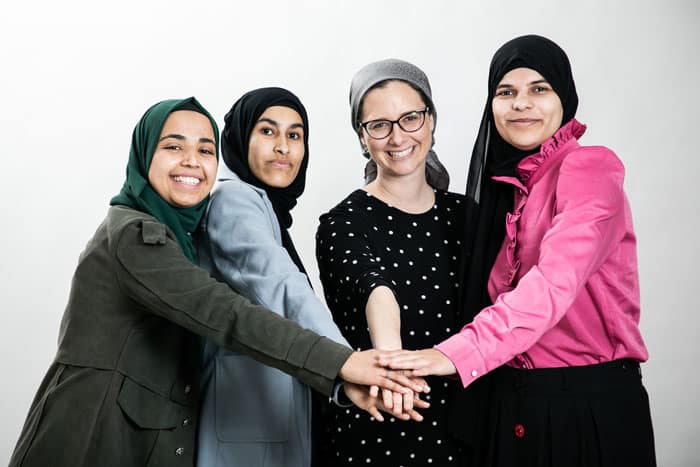 From left to right: Heba AlSana, Shereen Rafayaa, Menucha Saitowitz and Esraa Abo Mdegam
From left to right: Heba AlSana, Shereen Rafayaa, Menucha Saitowitz and Esraa Abo Mdegam Over a decade ago, Matan Yaffe, an Israeli Jew, was motorbiking in the Negev desert when, all of a sudden, four young Bedouins surrounded him and threatened to take his bike. While Yaffe tried to be reasonable with them and stop them from doing anything risky, they pulled out a metal bar. The former IDF officer took out his gun, and the Bedouins fled.
However, the encounter made a lasting impact on Yaffe. He realized that the Israeli Jews in the Negev were protecting themselves from the Bedouins with barbed wire and security, rather than working with their neighbors on trying to build peace within the region. He also learned that there are more than 300,000 Bedouins in the Negev, and the majority of them are under the age of 18. At the same time, 80% of Bedouin children live in poverty, and only 8% of Bedouins end up obtaining higher education.
Yaffe came up with an idea: he wanted to build bridges between Jews and Bedouins, while empowering Bedouins at the same time. So, in 2013, he founded Desert Stars, a nonprofit organization that cultivates a generation of Bedouin leaders to promote a thriving Bedouin community, as well as a strong Israeli society. His co-founder, Muhammad al-Nabari, is a former mayor in the Bedouin town of Hura.
“One thing we talk a lot about is this: the Jews living in Israel aren’t going anywhere,” said Menucha Saitowitz, partnerships officer at Desert Stars. “The Arabs living in Israel aren’t going anywhere either. We’re here together. Once you can accept that, you can begin to think of ways to make things better for all citizens of Israel.”
Desert Stars offers a more than 10 year course of educational programming: a service-based youth movement, unique Leadership High School, gap year leadership programs for both men and women and an extensive alumni program. Starting from age 12, Bedouin adolescents can become involved in the youth movement, and then attend the high school when they turn 14. The organization engages them well into their 20s, ensuring they will be prepared to succeed in their careers and beyond.
According to Saitowitz, one of the main goals is to ensure that young Bedouins have the opportunity to go to college and graduate; between 40-50% of general Bedouin society attend university and drop out during the first year as a result of academic, social and economic barriers. Additionally, Negev Bedouins face higher unemployment rates and earn less than any other Israeli community. Only 60% of men and 24% of women are employed.
“If something drastic isn’t done, we will have a crisis in the Negev.” – Menucha Saitowitz
“If something drastic isn’t done, having such a large population so disconnected from the rest of Israeli society, and without good education and employment opportunities, we will have a crisis in the Negev,” she said.
At Desert Stars, 70% of the graduates attend college, and almost none of them drop out. One of the participants from the organization’s second cohort is Amir Abu Kaf, who is one of 23 siblings from a remote Bedouin village with virtually no infrastructure. He took part in the Rothschild Scholars at Ben-Gurion University program and partnered with NGOs and municipalities to bring math, robotics and English language classes to his community. During the COVID-19 lockdowns, he worked with Ben-Gurion University to ensure that Bedouin students who didn’t have access to wifi and computers could still continue their studies.
“Before Desert Stars, I didn’t know that I had the ability to give to society, that I had something to give,” said Abu Kaf. “I suddenly realized that I had abilities that I hadn’t thought about at all, [like] creating a social project.”
Along with ensuring that the Bedouin population isn’t left behind, Desert Stars aims to build on peacemaking efforts between Israeli Jews and the Bedouins.
“Much of our work involves diving into issues of identity, [and we meet with] populations from across Israeli society [including] secular Jews, Haredi Jews, Christian Arabs, Druze, new immigrants from Ethiopia and Russia, and having intense conversations about values, identity [and] future visions for the country,” said Saitowitz. “Without these tough conversations, this meeting of different populations, then hundreds of thousands of Bedouin will never reconcile with the state. This, of course, has to come hand in hand with education, investment and opportunities for young people to integrate into academia and the workforce.”
She continued, “We have a lot more in common than we think. Making even a single friend with someone outside of your religion in Israel can lead to a whole new perspective.”























 More news and opinions than at a Shabbat dinner, right in your inbox.
More news and opinions than at a Shabbat dinner, right in your inbox.